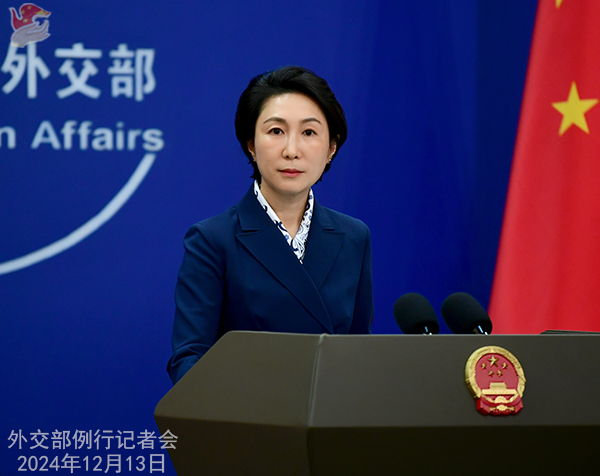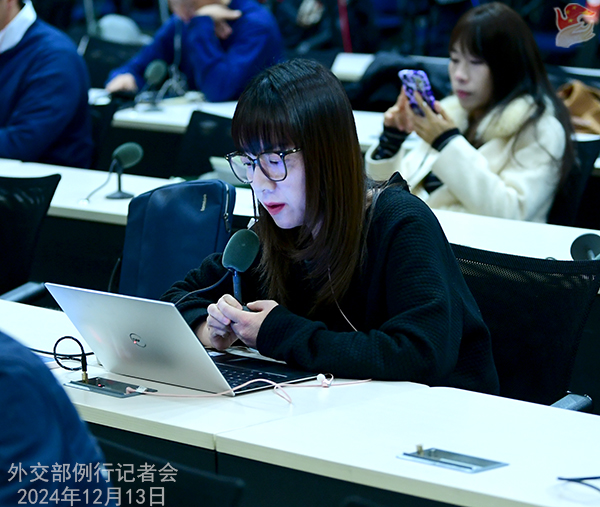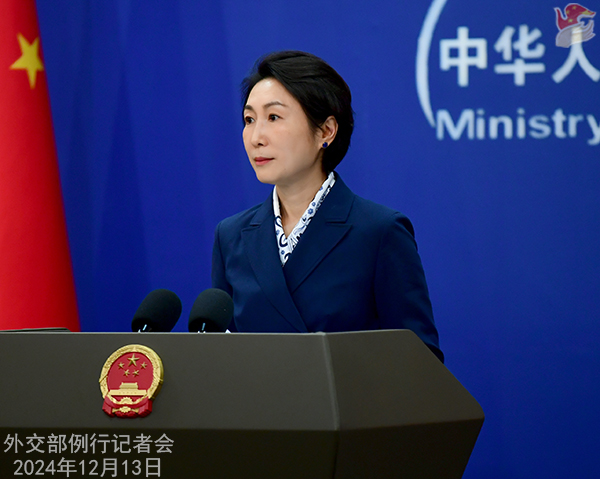
Yonhap News Agency: On President Yoon Suk Yeol’s remarks yesterday on the cases involving Chinese nationals and the Chinese Foreign Ministry’s response, the ROK Foreign Ministry said today that no matter how the situation in the ROK may change recently, the ROK will continue to develop its bilateral ties with China and at the same time maintain necessary communication with China. What’s China’s comment?
Mao Ning: I noted the response from the ROK Foreign Ministry. Yesterday we made clear China’s position on relevant comments about China from the ROK side. A healthy and stable China-ROK relationship serves the interests of both sides. We hope the ROK will make strong efforts to this end.
China Daily: “China Travel” is among the recently announced top 10 Chinese buzzwords of 2024. Tourism is a great way for foreigners to explore, experience and get to know the real China. For some international tourists, traveling in China has changed the way they see this country. Many foreign travel bloggers said they realized that China is not what they had previously thought, and they saw a China that the Western media would never show them. Do you have any comment?
Mao Ning: The China travel boom is a direct result of China’s high-standard opening up. In the first three quarters of this year, China received around 95 million international visitors, up by nearly 80 percent year on year. With China opening its door wider and adding more countries to its visa waiver program, there is no doubt that this China travel boom will continue.
As Confucius famously said, “it is delightful to have friends coming from afar.” We Chinese are a warm and hospitable people, and China will always embrace the world with open arms. We welcome more international friends to come and see, experience and understand China.

Global Times: Recently, the “Global Development Report 2024” was launched in Beijing. Participants commented that the report is comprehensive and solidly based on statistics, playing a positive role in forming consensus on development and addressing common challenges in the international community. There is also a high level of recognition for China’s contribution to global development, with many saying that the China-proposed GDI echoes countries’ aspirations for development and can help steer the UN 2030 Agenda for Sustainable Development back on track. What’s your comment on that?
Mao Ning: The release of the “Global Development Report” is an important step to implement the Global Development Initiative (GDI). As the third annual report on the GDI released by relevant Chinese institutions, it forges consensus on global development, and explores cooperative paths and practices to address global development challenges.
As President Xi Jinping said, prosperity and stability would not be possible in a world where the rich become richer while the poor are made poorer. Faced with the wider development divide, China has always put development at the center of the international agenda. Since it was put forward more than three years ago, solid steps have been taken under the GDI in mobilizing resource, building mechanism, and promoting cooperation. The GDI has mobilized nearly 20 billion US dollars in development funds and carried out over 1,100 cooperation programs that benefited people in different countries. Over 80 countries have joined the Group of Friends of the GDI. At the recent G20 summit, President Xi outlined China’s eight actions for global development, which respond to the strong aspirations of Global South countries for prosperity and transformation, and create more opportunities for the vast developing countries.
As the world’s largest developing country, China stands ready to deepen cooperation in development and accelerate the implementation of the UN 2030 Agenda for Sustainable Development to benefit people from more countries.
Reuters: China’s Defense Ministry this morning said that the Philippines had caused trouble in the South China Sea and had been instigated by the United States. Is the Foreign Ministry able to provide any specific examples of how the United States has instigated the Philippines causing trouble in the South China Sea?
Mao Ning: I’d refer you to the Ministry of National Defense for its statement. We have shared China’s position and the facts on the maritime disputes between China and the Philippines many times before, which you may refer to.
Dragon TV: It’s reported that US Senator Rick Scott released a statement this week saying that garlic grown in China poses “major threat” to food safety in the US and requesting to include garlic from China in the List of Goods Produced by Child Labor or Forced Labor and initiate Section 301 investigation. The US House of Representatives has passed the National Defence Authorisation Act (NDAA) for fiscal year 2025, which includes a ban on Chinese garlic in military stores. What’s China’s comment?
Mao Ning: I wonder if you saw online the response of Chinese net users to this US politician’s statement, how they laughed at this absurd accusation. I don’t think it could ever occur to garlic that it would pose a “major threat” to the US. From drones to cranes, from refrigerators to garlic, more and more Chinese-made products have been accused by the US of “posing national security risks.” But has the US shown any reliable evidence or rationale to back up those accusations? They are apparently just a way to justify US protectionism and abuse of state power to contain China’s development and push for decoupling and severing of supply chains.
Let me stress that overstretching the concept of national security and politicizing and weaponizing trade and tech issues will only heighten security risks in the global industrial and supply chains. This will do no one good. We urge some US politicians to gain some rationality and common knowledge, to avoid exposing themselves to public ridicule.
